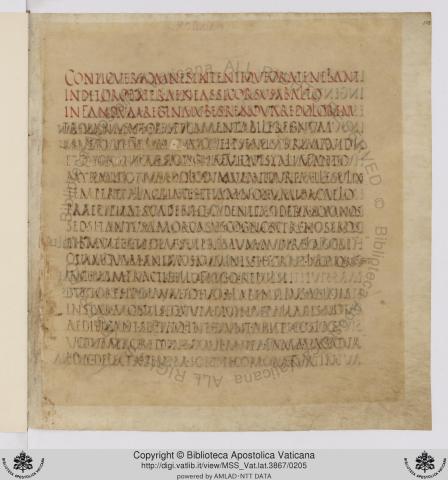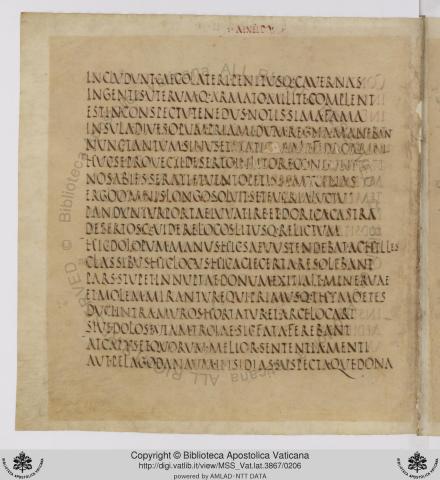Conticuēre omnēs intentīque ōra tenēbant;
inde torō pater Aenēās sīc ōrsus ab altō:
Īnfandum, rēgīna, iubēs renovāre dolōrem,
Trōiānās ut opēs et lāmentābile rēgnum
ēruerint Danaī, quaeque ipse miserrima vīdī5
et quōrum pars magna fuī. Quis tālia fandō
Myrmidonum Dolopumve aut dūrī mīles Ulixī
temperet ā lacrimīs? Et iam nox ūmida caelō
praecipitat suādentque cadentia sīdera somnōs.
Sed sī tantus amor cāsūs cognōscere nostrōs10
et breviter Trōiae suprēmum audīre labōrem,
quamquam animus meminisse horret lūctūque refūgit,
incipiam. Frāctī bellō Fātīsque repulsī
ductōrēs Danaüm tot iam lābentibus annīs
īnstar montis equum dīvīnā Palladis arte15
aedificant, sectāque intexunt abiete costās;
vōtum prō reditū simulant; ea fāma vagātur.
Hūc dēlēcta virum sortītī corpora fūrtim
inclūdunt caecō laterī penitusque cavernās
ingentēs uterumque armātō mīlite complent.20
notes
Manuscripts: M | P | R 1-18, 19-20
Aeneas undertakes to recount the story of his adventures (1–13); the stratagem of the wooden horse (13 ff.) (Bennett).
1: conticuēre: = conticuērunt. This ending is very rare in Caesar, but common in poetry, being often convenient for metrical purposes (C-R). The compound expresses the intensity of the silence, the tense marks the instantaneous check to the cheerful excitement of the company (Austin). The perf. describes a single completed act—”silence fell on all”: the imperf. tenēbant expresses duration—“turning their faces (towards Aeneas) they were keeping them (turned towards him)” (Page). The prefix in conticuēre has an intensive force (F-B). intentī: may be rendered adverbially “intently, earnestly” (Frieze). The whole expression is however perhaps only a variation for intenta ora tenēbant (Sidgwick).
2: torō: i.e., the banquet couch (Comstock). The Greeks and Romans did not sit, but reclined, at their meals (C-R). Torus is properly the cushioning of the couch, something that swells (Austin). orsus: sc. est (F-B). The omission of est or sunt is very common, especially with deponent verbs (Page). altō: higher than the others, as a mark of honour (Howson).
3–8: Notice how these lines are filled with expressions of sorrow: infandum...dolorem, lāmentābile (a most sonorous word), miserrima, quis...temperet ā lacrimīs. So Odysseus (Od. 9.12 f.) begins his story to Alcinous with emphasis on the sufferings, which he is asked to recall (Williams).
3: infandum: emphatic position, “Too sad for words (lit. ‘unspeakable’) is the tale of sorrow you bid me revive” (Comstock). renovāre: sc. mē (F-B).
4: ut: “how,” introducing an indirect question, which is dependent on the sense of “telling” implied in renovare dolorem (F-B). lāmentābile: adjs. in -bilis are usually passive as here (H-H) (AG 252).
5: Danaī: “the Greeks,” one of the Homeric names for the Greek host who attacked Troy. Danaus was the mythical king of Argos, and the name meant the Argives originally (Sidgwick). The name used most often by Virgil for the Greeks, and least often by Homer (Austin). quaeque: “and (the things) which”; the antecedent, ea understood, is in the same construction as dolōrem (Frieze). Quae and quōrum (line 6) are relative, not interrogative, pronouns, hence the change of mood. The relative sentences are in loose apposition to the previous lines, whose meaning they extend (C-R). ipse: This is strictly true, as the narrative is purely personal, and does not pretend to be a complete account of the capture of Troy (Howson).
6: fandō: “while uttering”; a gerund in the ablative expressing the relation of while and equivalent to a present participle. This usage also occurs occasionally in prose (Frieze) (AG 507). “In recounting such events”; fandō is ablative of attendant circumstance (Bennett).
7: Myrmidonum Dolopum: join with quis as a partitive (AG 346a). The Myrmidons and Dolopians were Thessalian soldiers, followers of Achilles, and, after his death, of his son Pyrrhus or Neoptolemus. They are specified here as being the most bloodthirsty enemies of Troy (Frieze). With mīles, quis is to be supplied as an adjective (Bennett). durī...Ulixī: “ruthless Odysseus.” The nature of the general gives a hint of that of his soldiers (Knapp). “The patient Ulysses,” one of the Homeric epithets for him: he bore ten years’ war and ten years’ wanderings. Observe the irregular gen. Ulixī from nom. Ulixēs (Sidgwick). Greek proper names in -ēs of the third declension have the genitive in both -is and -ī (C-R) (AG 83f).
8: temperet ā lacrimīs: Potential subj., in a question implying a negative answer (Chase) (AG 444). “Could refrain from tears…” the verb is more commonly followed in this sense by the abl. alone or by the dat. (G-K).
8–9: nox caelō praecipitat: intransitive, as in 9.670 nimbī in vāda praecipitant (Storr). The poet conceives darkness as descending upon the earth from the sky (Bennett). Nox is personified and represented as driving through the heaven in a chariot (Chase). Night, like the day (1.745), rises from the ocean, mounts the heavens, and descends into the ocean again (Knapp). caelō: in poetry the preposition is often omitted in phrases of motion from (C-R).
10: amor: sc. est. The word has here the sense of dēsīderium (F-B). cognōscere: complem. inf. with amor (est), which is equivalent to a verb of wishing (G-K) (AG 456). This use of an infinitive with a substantive is poetical. In prose it would be cognōscendī (F-B) (AG 504).
11: suprēmum...labōrem: “the final disaster” (Frieze); “the last agony” (G-K); “the death-struggle” (Storr). The day of a person’s death was called his diēs suprēmus (Knapp).
12: meminisse horret: “shudders to recall.” Verbs of fearing regularly take the infinitive in this sense, though usually only vereor is in fact so used (G-K) (AG 456). refūgit: Observe the quantity, indicating perfect tense (Page). The variation of tense is scarcely significant, since the feelings conveyed are concurrent and interchangeable (Horsfall).
13: incipiam: usually translated “I will begin,” but possibly “I will undertake, or attempt” (H-H).
14: ductōrēs: = ducēs. Archaic tone (F-B). Danaüm: = Danaōrum (F-B). lābentibus: abl. abs. (AG 466). “Seeing that now so many years were slipping away” (Howson).
15: īnstar: in apposition with equum, and governing the genitive. It may be translated “as large as” (Frieze). With one exception (6.865) īnstar is always used with a gen. (e.g. 3.637 Phoebēae lampadis īnstar, 7.707 magnī āgminis īnstar), and it is only found in nom. and acc. (Page) (AG 359b). Palladis: Pallas not only favoured the Greeks, but was also the patroness of all handicrafts (Page).
16: sectāque...costās: The process of placing the planks horizontally across the ribs is compared to the passing of the horizontal “threads” of the wood across the vertical threads of the warp in weaving (Page). abiete: is to be pronounced abyete, three syllables (Bennett). In 112 he speaks of the horse as made of “maple beams” and in 186 of oak: a natural poetic variation. He means “wood” (Sidgwick). The word rōbur, when used of the horse in 186, 230, 260, has the general sense of “wood” rather than its special meaning “oak” (Williams).
17: vōtum...simulant: “pretend it as an offering”; vōtum is predicate accusative. As direct object of simulant, eum referring to equum, is to be supplied in thought (Bennett). prō reditū: to ensure a favorable voyage, and perhaps as a thank-offering for getting safely away (C-R). ea fāma vagātur: “Such is the tale that spread” (Storr).
18: hūc: “in it,” literally, “hither,” and used because the verb implies motion (F-B). Hūc is equivalent to in equum (Frieze). dēlēcta vir(ōr)um corpora: a periphrasis for delēctōs virōs, the corpora, however, implying bodily vigor (F-B).
19–20: Note the development from caecō laterī to cavernās ingentēs and finally to uterum. Hard consonants are noticeably dominant in these lines, perhaps suggesting the clatter of the climbers into the Horse (Austin). cavernās...uterumque: hendiadys for “the hollow belly” (Bennett). -que here, as often, is used to give an explanation, not an additional detail (C-R).
19: caecō: here used in a passive sense (Howson). The epithet suggests the dark vastness of the hidden recesses in the Horse (Austin). laterī: explains hūc, and refers more definitely to the interior of the horse (Frieze). Dat., in a sort of apposition with hūc, but governed by inclūdunt (G-K) (AG 370).
20: mīlite: “with soldiery”; used collectively (Frieze). As is often the case in Virgil, the second part of the sentence explains the first, and the dēlēcta corpora (18) are identical with the armātō mīlite (F-B).
vocabulary
conticēscō, ticuī, 3, inc. n.: to become still; be still, hushed, silent, 2.253. (com- and taceō)
intentus, a, um: earnestly attentive, intent, 2.1; expectant, 5.137. (intendō)
torus, ī, m.: a bed, couch, 1.708; seat, 5.388; royal seat, throne, 8.177; bank, 6.674; the swelling part of flesh; a brawny muscle.
Aenēās, ae, m.: 1. A Trojan chief, son of Venus and Anchises, and hero of the Aeneid, 1.92. 2. Aenēās Silvius, one of the Alban kings, 6.769.
ōrdior, ōrsus sum, 4, dep. a. and n.: to weave, spin; to begin; begin to speak; begin, 1.325.
īnfandus, a, um: (adj.), not to be uttered; unutterable, inexpressible, unspeakable, 4.85; cruel, 1.525; dreadful, horrible, 10.673; accursed, perfidious, 4.613; fatal, 2.132; neut., in exclamations, īnfandum! O shame, O woe unutterable! 1.251; pl., īnfanda, as(adv.), 8.489.
rēgīna, ae, f.: a queen, 1.9; princess, 1.273. (rēx)
iubeō, iussī (fut. perf. iussō for iusserō, 11.467), iussus, 2, a.: to order, request, usually w. inf., freq.; bid, 2.3; ask, invite, 1.708; will, wish, desire, 3.261; direct, enjoin, admonish, 3.697; persuade, advise, 2.37; to clear by command, 10.444; w. subj., 10.53.
renovō, āvī, ātus, 1, a.: to renew; revive, suffer again, 2.3; brave, risk, dare again, 2.750.
Trōiānus, a, um: adj. (Trōia), Trojan, 1.19; subst., Trōiānus, ī, m., a Trojan, 1.286; pl., Trōiānī, ōrum, m., the Trojans, 5.688.
ut (utī): (adv., interrog.), in what manner, how? 1.466, et al.; sometimes with indic. in a dependent question, 6.855; how gladly, 8.154.
lāmentābilis, e: adj. (lāmentor, deplore), deplorable; pitiable; to be deplored, 2.4.
ēruō, ī, tus, 3, a.: to cast out or up; to overthrow, 2.5.
Danaī, ōrum, m.: the Greeks, 2.327.
Myrmidones, um, m.: the Myrmidons, Thessalian followers of Achilles, once dwelling in Aegina, where they had been transformed from ants to men in answer to the prayer of Aeacus, grandfather of Achilles, 2.7, et al.
Dolopes, um, m.: the Dolopians, a warlike tribe of Thessaly, followers of Pyrrhus at Troy, 2.7.
Ulixēs, is, eī or ī, m.: Ulysses, son of Laertes, king of Ithaca, and one of the Greek chiefs at Troy, distinguished for shrewdness and cunning, 2.44, et al.
temperō, āvī, ātus, 1, a. and n.: to attemper; combine in due proportions; with acc., regulate, adjust; refresh; allay, moderate, calm, 1.146; restrain, 1.57; with abl. or dat., abstain from, 2.8. (tempus)
ūmidus, a, um: adj. (ūmeō), moist, wet, damp, dewy, 2.8, et al.; liquid, 4.486.
praecipitō, āvī, ātus, 1, a. and n.: to cast headlong, hurl, plunge, 2.37; urge, hurry, hasten; impel, incite, 2.317; break off, end swiftly, 12.699; hasten away, 4.565; n. (sc. sē), fall headlong, 6.351; descend swiftly, 2.9; run down, 4.251. (praeceps)
suādeō, suāsī, suāsus, 2, n. and a.: to advise, warn, urge, exhort, 1.357, et al.; invite, 2.9; impel, prompt, 11.254; compel, force, 10.367.
Trōia, ae, f.: 1. Troy, the capital of the Troad, 2.625, et al. 2. A city built by Helenus in Epirus, 3.349. 3. A part of the city of Acesta in Sicily, 5.756. 4. The name of an equestrian game of Roman boys, 5.602.
meminī, isse, def. a. and n.: (w. acc., gen., or inf.), to have in mind; remember, be mindful, recollect, 1.203; distinguish, 3.202. (rel. to mēns)
horreō, 2, n. and a.: to bristle up or be bristling, 6.419; to bristle, 11.602; (fig.), to shudder, tremble, 2.12; shudder at, fear, dread, 4.209.
lūctus, ūs, m.: a mourning; sorrow, grief, woe, lamentation, 2.298, and freq.; personif., 6.274. (lūgeō)
refugiō, fūgī, 3, n. and a.: to fly, 3.258; flee away, 6.472; recede, stand distant, 3.536; shrink, 2.12; w. acc., start back from, 2.380; shrink from, refuse, 7.618; fugere, refugere, to fly to and fro, 12.753.
repellō, reppulī, repulsus, 3, a.: to push or drive back; repel, 2.13; reject, refuse, disdain, 4.214.
ductor, ōris, m.: a leader, 1.189; captain, commander, 5.133; prince, king, 9.691. (dūcō)
lābor, lapsus sum, 3, dep. n.: to slide, glide down, or slip, freq.; fall down, 2.465; ebb, 11.628; pass away, 2.14; descend, 2.262; glide, sail, skim along, 8.91; flow, 3.281; fall, perish, 2.430; decline, 4.318; faint, 3.309.
īnstar, indecl., n.: an image; figure; noble or majestic form, majesty, 6.865; w. gen., likeness; the size of, as large as, 2.15; like, 3.637. (1. in and stō)
dīvīnus, a, um: adj. (dīvus), relating to the gods; heaven-descended, divine, 5.47; heavenly, 1.403; inspired, prophetic, 3.373.
Pallas, adis, f.: Pallas Athena, identified by the Romans with Minerva, 1.39; rāmus Palladis, the bough sacred to Pallas, the olive, 7.154.
aedificō, āvī, ātus, 1, a.: to build; to construct, make, 2.16. (aedēs and faciō)
secō, secuī, sectus, 1, a.: to cut, freq.; cut off, 4.704; engrave, carve, 3.464; cut through, cleave, 5.218, et al.; of the channel of a river, 8.63; sail through, pass, 8.96; speed, 6.899; shape out mentally, form, 10.107.
intexō, uī, tus, 3, a.: to weave into or in; work in, inweave, 5.252; festoon, wreathe, entwine; cover, 6.216; frame, 2.16.
abies, etis (often trisyll. in the oblique cases), f.: a fir tree; fir wood or fir timber, 2.16; (meton.), a ship, 8.91; a lance, 11.667.
costa, ae, f.: a rib, 1.211; side.
reditus, ūs, m.: a return, 2.17. (redeō)
simulō, āvī, ātus, 1, a.: to make similar; imitate, 6.591; pretend, 2.17; to make a false show of, feign, 1.209; p., simulātus, a, um, made to imitate, counterfeiting, 4.512; dissembling, 4.105; imitating, resembling, 3.349. (similis)
vagor, ātus sum, 1, dep. n. and a.: to wander about, 6.886; ride to and fro, career about, 5.560; to be rumored round, spread, 2.17. (vagus, wandering)
dēligō, lēgī, lēctus, 3, a.: to choose from; choose, 2.18. (dē and legō)
sortior, ītus sum, 4, dep. n. and a.: to cast lots; obtain, get, take by lot, 3.634; share, 8.445; distribute, 3.510; assign, allot, appoint, 3.376; select, choose, 2.18; 12.920. (sors)
fūrtim: (adv.), by stealth, secretly, 2.18. (fūr)
inclūdō, clūsī, clūsus, 3, a.: to shut in, inclose, 6.680; secrete, 2.19; for interclūdō, stop, choke, 7.534; to mount, set, inlay, adorn, 12.211. (1. in and claudō)
penitus: adv. (cf. penes), inwardly, far within, deep, deeply, 1.200; wholly, entirely, 6.737; afar, 11.623; far away, 1.512.
caverna, ae, f.: a hollow; cavern, 2.53, et al. (cavus)
uterus, ī, m.: the womb, belly, 11.813; cavity, 2.38.
armātus, a, um: armed, charged, 12.857. (armō)
compleō, ēvī, ētus, 2, a.: to fill up; fill, 2.20; complete, 5.46; fulfill, 9.108.




